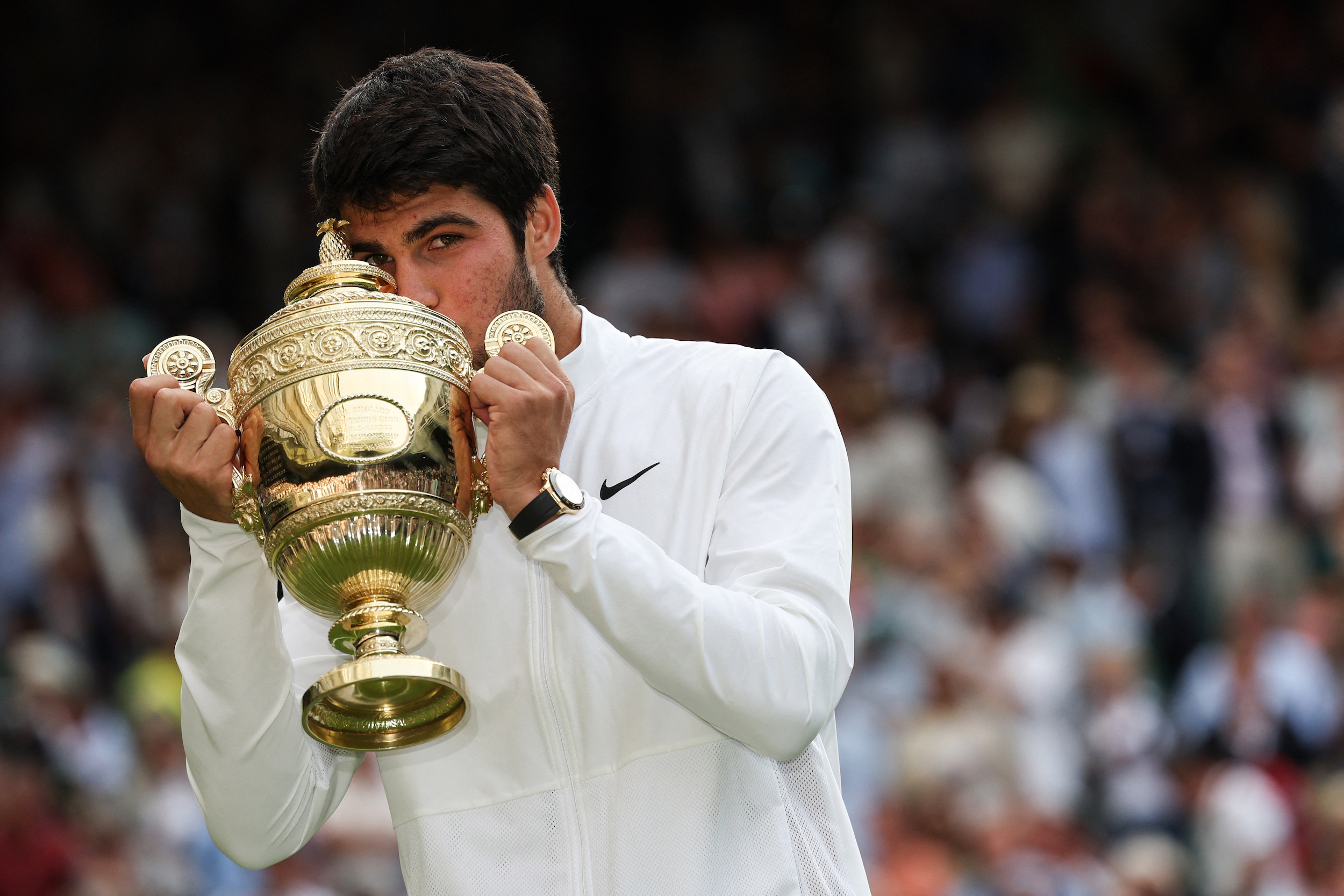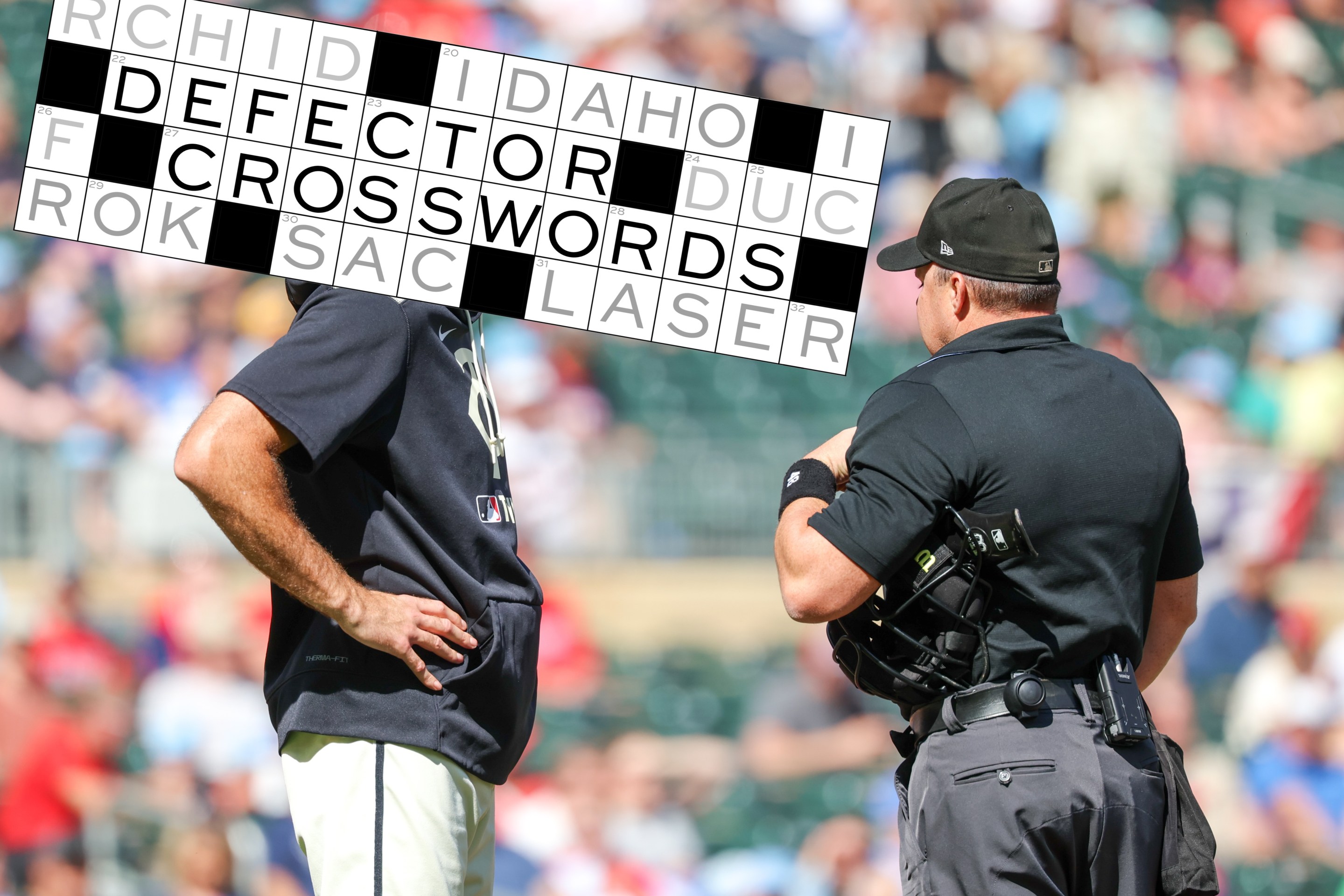Two days before he played Novak Djokovic for the Wimbledon title, 20-year-old Carlos Alcaraz made a puzzling remark to the crowd on Centre Court. "It's going to be the best moment of my life, probably," he said, of a high-pressure contest against a man who has spent the duration of Alcaraz's conscious life siphoning his opponents' joy with airtight tennis.
It was an odd claim from Alcaraz—a blip in translation, I figured. While a Wimbledon final against Djokovic could wind up being the best moment of his life, it could plausibly take so many other more painful forms for the unseasoned grass-court player. It could end in straightforward defeat to a man with seven Wimbledon titles to his name, including the last four straight; gruesomely in full-body anxiety cramps, the way their French Open semifinal did last month; or in a heart-rending deciding-set collapse. These outcomes seemed well removed from "best moment of my life" territory, especially for a kid who could already pin that badge to his own U.S. Open victory last year. The actual outcome made his claim look like prophecy: Alcaraz defeated Djokovic 1-6, 7-6(6), 6-1, 3-6, 6-4 on Sunday.
What jars me as an observer, and what should scare any men's player angling for a big title for the foreseeable future, is that the pursuit alone seems to electrify Alcaraz. The thrill of it is legible in every point of audacious and untrammeled tennis he plays. It feels almost wrong; problem-solving shouldn't be so pleasurable. Often in sports, insight is the fruit of toil invisible to the casual observer, hashed out in dry-erase boards, film sessions, only reconstructed in the rosy retrospectives. With Alcaraz the entire learning curve might be crammed into the space of a single afternoon, in public, his only external input a few firm nods from his coach Juan Carlos Ferrero.
Alcaraz has an alarmingly efficient mechanism for converting failures into insights (and grins). The speed of this process sometimes generates unintentional humor, as it did with his post-Wimbledon remarks. "As I said before, I am totally different player than French Open. I grew up a lot since that moment," he said sincerely about a match played five weeks prior. He undergoes emotional and professional transformation in the span of time when most civilians might only fill a laundry hamper.
Alcaraz enjoys conquering new surfaces, moving from his native clay to hard court. He enjoys the all-court improvisational tennis that scares off his rhythm-loving peers. He enjoys checking off the items on his career to-do list well before even his most fevered optimists thought possible. He enjoys that enjoyment-proof task of facing Djokovic in a major final. He probably would even enjoy a 26-minute-long, 13-deuce game within that match. As a result, he now enjoys two major trophies and the promise of many more. This mindset—and, obviously, the superlative talent that enables it—separates him from so many would-be challengers to the hegemony of men's tennis over the last decade, who seemed to carry the rational amount of dread into their appointments with Djokovic. For all their talents on the court, those guys don't seem to love the process to this degree.
Consider the timeframes here. At the start of the grass-court season in June, Alcaraz, who did not grow up with much exposure to the surface, and had previously played just six tour-level matches on it, was talking about the novelty of moving on slippery turf. "I have to be really focused on every move, every shot, so for me, it's more tiring when you're moving on grass," he said. "I have to do a specific work to move on grass."
He got a pretty good handle on that specific work. By the end of the week, Alcaraz lifted the title at Queen's Club. After 25 hours and 54 minutes of match play in his professional grass-court career, he had won a 500-level title. Now, 46 hours and 15 minutes into his grass-court career, he has won Wimbledon. There's been no time to compile clips for a training montage of resilience; real genius gets to skip over that. What he does instead are these baffling leaps in competence.
In the third round, Alcaraz was tested by No. 25 seed Nicolás Jarry, one of the biggest servers on tour in the best patch of his career. In the fourth round, he handled Matteo Berrettini, a former Wimbledon finalist who has regained his concussive serve and forehand after an injury lull. Little time was wasted in the quarterfinal as Alcaraz dispatched his fellow 20-year-old, the No. 6 seed Holger Rune, peeling apart the distinct tiers of "prodigy" for the public's edification. In the semifinal, he made another leap, chopping up Daniil Medvedev, the No. 3 seed and a fellow gifted problem-solver, in under two hours.
And in the title fight, Alcaraz took down No. 2 seed and seven-time Wimbledon champion Djokovic, a 36-year-old who has explicitly described how much he enjoys playing younger players in the best-of-five format—who appears to hunt them for sport, spotting them free sets here and there, as a test of his own focus and endurance. Beating Novak Djokovic in a major final requires defeating many different iterations of him. Over the course of nearly five hours on Sunday, Alcaraz met a representative sampling.
There was the classically imperious Djokovic, who used returns, depth, and change of direction to snatch the first set 6-1 before an opponent has found their range. (Most days, this is the only iteration an opponent will ever get to meet.) In the second set there was the steady Djokovic, who, confronted with a worthy opponent, grinded his way to a tiebreak, secure in his mastery of high-pressure points, his spot-serving and calibrated aggression. Then there was the rope-a-dope Djokovic seen in the middle of this match, who let his despair flash up to the surface, used the crowd's antagonism as a renewable energy resource, sparred with the umpire over a serve-clock violation, clutched and shook the parts of him that hurt. When pushed to the boundaries, he emerged as deciding-set Djokovic, who transcended all pain and fatigue in the ascetic pursuit of execution. He dared a challenger to go dowsing for some of that late-match resolve that he had in barrels and barrels.
Alcaraz met and managed all of these iterations, maturing in real time. At the outset of a big match, he often has the character of an overstimulated puppy in a crowd of new faces, hopped up on the energy of the stage. The cuts he takes on the ball are too big, the shot selection too audacious, the gap between what he wants to do and what he can do too visible. Over time that excitement cools and congeals into confidence, as he drags his vision into alignment with his abilities. The play between Alcaraz and Djokovic in the match has the same texture of the tennis played between members of the Big Three—Djokovic plus his rivals Rafael Nadal and Roger Federer—over the last 15-odd years. Only a pair of generational players can bring this Wide Tennis into being, because only they meld defense and offense at these levels, extending points well past their natural conclusions, dragging the rallies beyond the common boundaries of play. They present tennis as a delirious run-on sentence.
The difference now is that the cat-and-mouse is not between two contemporaries, but two players separated by almost 16 years. One of these players still has more room to develop. Last September I half-scoffed when Alcaraz's coach Ferrero said his pupil had only reached 60 percent of his game, as if he were laying out the blueprint for a luxury high-rise he hoped to construct at the summit of K2. Now I see what he meant.
Over the last month, Alcaraz's questions narrowed in specificity, from How do I move well on grass? to How do I modify the shape and spin of my forehand approach shot to best exploit Djokovic's backhand in the third set? Over this final alone, he answered a range of questions. Faced with Djokovic's defense, he managed to smooth out his aggression, direct his finishing blows at bigger targets. In the windy conditions, he went for loopier and higher-margin shots, then trusted in his hypersensitive net touch to finish the task. Alcaraz did not invent the drop shot, as the more frenzied TV commentators seem to suggest, but he is its most gifted current practitioner, drawing out the contrast between his boomed groundstrokes and that soundless scoop; he sprinkled it in at crucial moments of the match. He survived a dip in his own serve quality—down to 55 percent of first serves in during the fourth set of this match—only to elevate it for the final service game of the match, where he landed all six of his first serves to win the championship.
Djokovic will remember a few points in this match with acute clarity, which he discussed in the postmortem presser. Few movements in sports are more reliable than a Djokovic backhand on a routine ball during a tiebreak; he missed two such balls in the second-set tiebreak, which was surreal to witness. Hours later, in the second game of the fifth set, Djokovic found a break point. After a smothering sequence of shots, he drew a desperation chipped lob out of Alcaraz; that ball looked like it might have even been floating out of bounds. But as Djokovic later explained, he saw Alcaraz running to the opposite corner, and wanted to surprise him with a drive volley down the line, taking the ball out of the air. Instead it just died in the net. Alcaraz then held serve and secured a break of his own in the following game.
As the 23-time major champ conceded, he has been the beneficiary of swerves in fortune. "I guess when all the emotions are settled, I have to still be very grateful, because I won many, many tight and close matches in the past here," he said on court. "To name a few, 2019 against Roger in that final when I was match points down. Maybe I should have lost a couple of finals that I won. So I think this is even-Steven."
Alcaraz, conducting his own on-court interview with the trophy in his arms, stated the obvious about himself, though he did it with a precocious charm. "I learn really, really fast, and I'm really really proud of myself," he said. This is a steady throughline in all of his victorious interviews: "pride," the sense that he is enjoying the ride, folding every win into an ever-fortifying sense of self. Carlos Alcaraz is already the No. 1 men's tennis player in the world, a major champion on hard court and now on grass. With an ESPN mic in his face, a few minutes removed from his triumph, he staked out his next goal: "I'm ready to move forward, being the big rival of Novak." He'll enjoy that, too.






